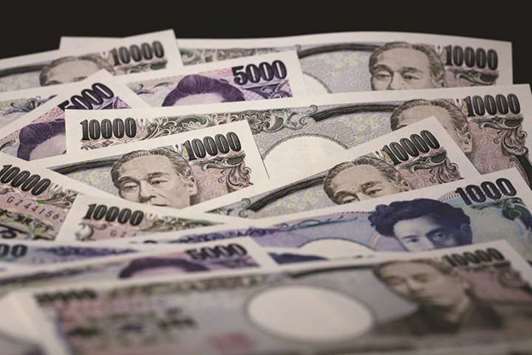Japanese money managers are betting the benchmark 10-year bond yield may drop back below zero as a strengthening yen restricts the central bank’s ability to scale back debt purchases.
The yen rallied yesterday as free-trade advocate Gary Cohn’s decision to resign as US President Donald Trump’s top economic adviser deepened concern the latter’s tariff plans will trigger a global trade war.
That added to gains seen last week after the Bank of Japan cut the amount of super-long bonds its buys. A stronger currency limits the BoJ’s room for manoeuvre as it depresses inflation, which the central bank is trying to foster.
“The BoJ may prioritise halting the yen from rising, even if the 10-year yield is pushed below zero,” said Akio Kato, general manager of trading at Mitsubishi UFJ Kokusai Asset Management Co in Tokyo.
The BoJ will seek to avoid more yen strength, which poses a bigger risk to achieving its inflation target, even if that entails a negative 10-year yield, asset managers say. Lessening stimulus before reaching the 2-percent inflation target is unthinkable, Governor Haruhiko Kuroda said in parliament on Tuesday.
The BoJ yesterday kept purchase amounts for various bond maturities unchanged from the previous operations.
The yen was up 0.4% at 105.68 per dollar in Tokyo. It climbed as much as 0.6% earlier to 105.46, near a 16-month high of 105.25 hit on March 2, following the news of Cohn’s resignation.
“It’s not already what they need,” the stronger yen, and it’s “not getting any easier” for the BoJ to combat that, Laurence Mutkin, global head of G10 rates strategy at BNP Paribas in London, said on Bloomberg Television.
The yen has tended to rally following a BoJ cut in bond buying, as currency speculators see any reduction as a sign the central bank is looking to normalise its ultra-loose policy. It climbed for six days in January after the central bank trimmed purchases of super-long bonds and debt due in 10-to-25 years.
On the other hand, local bond investors have argued the BoJ’s tweaks are just aimed at giving itself leeway to continue with the easy stance for a longer period of time.
The JGB market is in this “weird position” of having the yield target, and meanwhile the yen is reflecting – as is being seen everywhere globally – the change in the valuation of the dollar, Mutkin of BNP Paribas said.
“The BoJ may not be able to cut purchases that much given the yen’s strength,” said Shinji Kunibe, general manager and head of fixed-income at Daiwa SB Investments in Tokyo. “Depending on external factors, the central bank may have to temporary allow negative yields.”
The benchmark 10-year yield has fallen to 0.05% from a six-month high of 0.095% reached in late January, as Japanese investors sought the safety of local bonds amid a pickup volatility in global debt markets.

The Bank of Japan will seek to avoid more yen strength, which poses a bigger risk to achieving its inflation target, even if that entails a negative 10-year yield, according to asset managers
